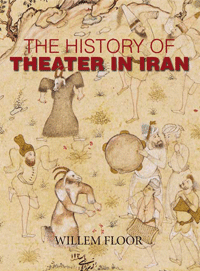
Gholonbeh
Iranian gift–wrapped insults
October 21, 2005
iranian.com
Serious thoughts must have gone into the selection of a Persian word that has enough power to unload a ton of weight on one’s heart. Gholonbeh in itself means an indescribable lump or a bulge of something, for example, if you stuff your pockets it will form a gholonbeh. However, in dialogue, the same word signifies a load of insult which is delivered in a roundabout way via metaphors and hints. You won’t find a definition for this word anywhere and, should there be a dictionary bold enough to include it, you’ll be sure to find the translation inadequate if not incorrect.
When used with skill, gholonbeh is nothing but a gift–wrapped insult, a camouflaged unkind criticism and a connotation that can creep into your heart and kill. Due to our embellished politeness – and perhaps the fear of appearing hostile – we use gholonbeh to deliver our ruthless message. Much like invisible ink or cyanide, a master of gholonbeh uses words that can’t incriminate her.
My first encounter with this goes back to years ago when at a party women were discussing fabric designs and I, at the height of barely over five feet, mentioned how much I enjoyed stripes. “Do you, really?” one woman said as if I had dared to say something offensive and, giving me the once over, she added, “Surely you mean vertical, don’t you?” Alas, her true comment was understood by all present, “At your height, you wouldn’t dare use horizontal stripes, would you?”
Our ancient culture and exaggerated politeness dictates that we should never insult others, but that if we have to resort to such a despicable act, it must be done with style and flair.
A few days ago, while waiting to be served at a Persian restaurant, I overheard this conversation between two ladies.
“Tell me about last night’s wedding, how was it?” one asked “Well,” the other responded with a mysterious hesitation and a meaningful sniff. “They served hotel food, the bride seemed mature and the groom – whom I know nothing of his background – seemed to be the perfect match. There was only a D.J., but the bride’s mother danced the entire night.”
While many listeners may find this to be a benevolent conversation about a mediocre wedding, the well-trained Iranian ears wouldn’t miss the hostile undertone. I know of at least two marriages that fell apart following similar comments from one side or the other.
Allow me to translate: “You didn’t miss a thing, honey!” (This is the ‘well,’ part because it is often accompanied by a raised eyebrow, a meaningful sniff and even a twist of the upper body.) “Not only did they serve cheap, bad food – and I mean bad, because I never heard of a wedding without shirin-polo and fessenjoon? – The bride was obviously an old maid and, quite deserving of Mr. Nobody! The thrifty people didn’t even bother with proper music, but that didn’t stop the bride’s mother from dancing with joy at having finally found that girl a husband.”
If this makes me sound vicious to you, I don’t blame you, but be assured that I’ve heard enough gholonbeh in my lifetime to enable me now to spot one even before it has been uttered. When I succeeded to enter the university, a relative whose daughter had failed the entrance exams and got married at nineteen said, “A girl’s true university is her marriage!” Years later, when I had my first child and spoke about the thrills of motherhood to the same lady, she said, “Marrying at a much older age, people appreciate the value of such things. Late-in-life babies must be very special!”
The comment was aimed at reminding me of the shame for having married at the old age of twenty-seven. Ah, what a “sweet tongue” our language can be! Hostility is so easily expressed; sometimes we don’t even need a complete sentence to get the message across. This reminds me of a story I heard from a neighbor who, despite her lack of physical attraction, happened to give birth to one of the most beautiful babies. She met a relative on the street who, unable to mask her admiration for the baby, asked her, “Whose is this beautiful child?” To which my neighbor beamed a smile and responded, “She is mine.”
Wide eyed, the relative took a step back, exclaiming, “Nah!”
 Centuries of diligent practice have brought about a few unmistakable expressions that may be ambiguous to a non-Persian, but are common knowledge to the rest of us. For example, if a bride is only described by personality, regardless of how complimentary the description may be, she’s ugly. “The climate has been good to you,” is a polite way to say you’re fat.” And, “She takes good care of herself,” means, “The woman is obsessed with her looks and would go to any length just to preserve what’s left of it.” Finally, “Mashallah you look young,” which for centuries used to be a way of saying that you’ve lived an easy life, nowadays conveys, “Cosmetic surgery – or whatever it is you’re doing to mask your age – has done a good job.” Centuries of diligent practice have brought about a few unmistakable expressions that may be ambiguous to a non-Persian, but are common knowledge to the rest of us. For example, if a bride is only described by personality, regardless of how complimentary the description may be, she’s ugly. “The climate has been good to you,” is a polite way to say you’re fat.” And, “She takes good care of herself,” means, “The woman is obsessed with her looks and would go to any length just to preserve what’s left of it.” Finally, “Mashallah you look young,” which for centuries used to be a way of saying that you’ve lived an easy life, nowadays conveys, “Cosmetic surgery – or whatever it is you’re doing to mask your age – has done a good job.”
Sometimes words can speak volumes. “Khosh be halet,” the benign expression that simply translates to “Lucky, you,” if said with the proper connotation and a skillful use of body language, could mean, “That’s way more than you are worthy of.” The same venom could be transfused through, “Khoda yek joe shans bedeh,” – if God grants a grain of luck – which implies that some people receive much more than they deserve. One might say this is a roundabout, more civil, way of the saying, “A red apple befalls the crippled hand,” which is the meaner Persian’s way of expressing pure envy.
My best friend complains that her mother-in-law no longer bothers with words. “She just rolls her eyes, turns her back, or gives out an exaggerated sigh that sounds like fishshsh,” she said.
“Maybe you’re too sensitive,” I responded in an effort to comfort her. “You could be reading too much into it.”
“How can you read too much into a direct sting?” she says. “The woman couldn’t be more obvious. The other day, she walked into my living room, rubbed a finger on my piano and her eyes rolled to the back of her head.”
“I hope you didn’t say anything, did you?”
She chuckles. “No, but I was tempted to bring her a can of furniture polish!”
Sometimes one gholonbeh only deserves another.
 But in-laws are a whole different breed and their attitude has nothing to do with ethnicity. It’s as if the minute we become in-laws, we earn a degree in the art of gholonbeh. Universally, when an in-law tells you your child takes after you, it is a criticism of either looks, manners, or both. By the same token, a beautiful child has inherited the good genes from the other side, not to mention the good manners, which are passed down directly from the mother-in-law. I’ve heard such comments repeatedly and sometimes catch myself saying, “She has her father’s finesse and is as neat as her grandma!” But in-laws are a whole different breed and their attitude has nothing to do with ethnicity. It’s as if the minute we become in-laws, we earn a degree in the art of gholonbeh. Universally, when an in-law tells you your child takes after you, it is a criticism of either looks, manners, or both. By the same token, a beautiful child has inherited the good genes from the other side, not to mention the good manners, which are passed down directly from the mother-in-law. I’ve heard such comments repeatedly and sometimes catch myself saying, “She has her father’s finesse and is as neat as her grandma!”
Once in a while, gholonbeh can take on a sincere tone and sound like concern. When someone is sad over how thin and frail your baby looks, it only means you’re not feeding him well. Likewise, you’ve heard people’s regretful remark over how a hard life has led to an early loss of someone’s youthful looks. “Bemeeram, che shekasteh shodi!” – may I die for you! How broken down you look – which in plain English only means, “You look like shit!”
Through the recent decades, Iranian immigrants have been through much hardship and it is understandable that some of us try to mask our identity and a few even take pride in being mistaken for Europeans. This in turn has brought about a whole new set of gholonbeh. “I knew you’re Iranian the minute I saw you.” Translation: “That bleached hair does nothing for you, baby!” Or, “As soon as you spoke, I could tell you’re from Iran,” to mean that your English sucks.
 It’s only fair to conclude that not only does the tradition go on, it now has crossed cultural borders. To be sure we have arrived, dragging along our good as well as the bad. When you think about it, the name “gholonbeh” is quite logical for the bulge of spiteful words stored in our memories, words for which we had no response at the time. It’s only fair to conclude that not only does the tradition go on, it now has crossed cultural borders. To be sure we have arrived, dragging along our good as well as the bad. When you think about it, the name “gholonbeh” is quite logical for the bulge of spiteful words stored in our memories, words for which we had no response at the time.
My friend puts down her coffee cup, makes a fist and says, “Someday I’m going to find myself a good target and unload all the gholonbeh I’ve heard.”
“You’d never be so cruel,” I say. “Who would you possibly want to hurt?”
A mischievous expression creeps into her eyes. “We’ll know that if my children ever get married, won’t we?”
Aha! That explains it: No harm intended, just recycling.
About
Zohreh Khazai Ghahremani is a retired dentist and a freelance
writer. She lives in San Diego, California. Her latest book is "Sharik-e
Gham" (see excerpt).
Visit her site ZoesWordGarden.com
|